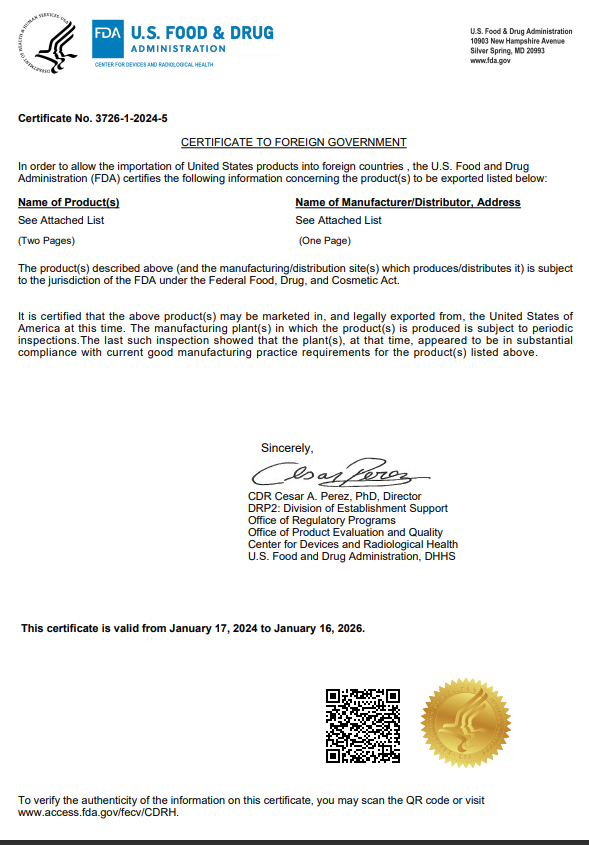CFG: Essential for Exporting Pharmaceuticals and Medical Devices
A Certificate to Foreign Government is a crucial legal document utilized in the export of pharmaceuticals and medical devices manufactured and sold in the United States. Issued by the Food and Drug Administration (FDA), this certificate confirms that the products meet U.S. laws and regulations. For companies exporting products to countries that are members of the Hague Convention, the destination country’s government mandates this certificate to ensure compliance with U.S. standards.
Certificate to Foreign Government
When exporting medical devices or pharmaceuticals internationally, compliance wi
th both U.S. regulations and the importing country’s requirements is vital. For products destined for Hague Convention member countries, a Certificate to Foreign Government is often required. This certificate serves as a guarantee that the exported products comply with U.S. laws and FDA regulations.
The FDA oversees the issuance of these certificates to assure foreign governments that products meet the stringent standards set forth by U.S. regulations. Although FDA approval is not necessary for exporting legally marketed products, some countries still require an E Apostille FDA certification. This certification confirms that the firm’s products adhere to U.S. FDA regulations, including Good Manufacturing Practice (GMP) requirements.
Requirements for Electronic CFG Apostille
To obtain a Certificate to Foreign Government, certain criteria must be met:
- FDA Registration: The manufacturing facility must be registered with the FDA.
- FDA Approval: The device or pharmaceutical must be approved by the FDA.
- Premarket Notification or Approval: The device must have either a cleared Premarket Notification [(510(k)] or an approved Premarket Approval (PMA) Application. Devices on the market before May 28, 1976, or those classified as De Novo are also considered.
- Regulatory Compliance: The device must adhere to the categorizing requirements of Title 21 Code of Federal Regulations (CFR) Part 801 (21 CFR 801) or 21 CFR 809. Additionally, it must be manufactured according to the Quality System (QS) regulations outlined in 21 CFR 820 unless exempt by regulation.
Digital Apostille Certificate to Foreign Government
FDA Apostille offers an attestation service for the Certificate to Foreign Government issued by the U.S. Food and Drug Administration. This service is crucial for documents destined for use in Hague Convention Participating Countries. To facilitate this process, FDA Apostille obtains the Apostille for the Certificate to Foreign Government from the U.S. Department of State in Washington, D.C.
The Digital Apostille Certificate to Foreign Government provides a streamlined method for authenticating documents. It ensures that the certificate is valid and recognized by the destination country’s government. The digital apostille process helps expedite international trade by verifying that U.S. pharmaceutical and medical device exports meet the necessary regulatory standards.
Certificate to Foreign Government Legalization
FDA Apostille also supports the authentication of the Certificate to Foreign Government from both the U.S. Department of State and the embassy of the destination country. This embassy legalization is essential for documents that are intended for use in Non-Hague Convention Participating Countries. The embassy’s validation ensures that the document is accepted and recognized in countries that do not adhere to the Hague Convention’s apostille agreements.
Why Certificate to Foreign Government Matters
The Certificate to Foreign Government plays a pivotal role in international trade for U.S. pharmaceutical and medical device companies. It provides assurance to foreign governments that products have been manufactured according to U.S. standards and are compliant with FDA regulations. This certification helps facilitate smooth entry into international markets by meeting the import requirements of various countries.
For companies looking to export their products globally, understanding and obtaining the Certificate to Foreign Government is an essential step. This process not only aligns with international regulatory requirements but also enhances the credibility and acceptance of U.S. products in the global marketplace.
In summary, a Certificate to Foreign Government is an indispensable document for U.S. companies engaged in the export of pharmaceuticals and medical devices. Issued by the FDA, this certificate confirms compliance with U.S. regulations and is crucial for meeting the requirements of foreign governments. Whether navigating the requirements of Hague Convention member countries or Non-Hague Participating Countries, the process involves both FDA approval and, in some cases, embassy legalization.
FDA Apostille services streamline this process by providing the necessary apostille and authentication services to ensure that the Certificate to Foreign Government is valid and recognized internationally. By adhering to these requirements, U.S. companies can successfully export their products and maintain a strong presence in the global market.
